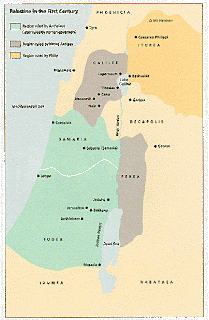Deuteronomy 18:15-20; Psalm
111
1 Corinthians
8:1-13; Mark
1:21-28
Rip.
That is the sound that opens and closes the Gospel of Mark.
It is the sound of the heavens tearing open as Jesus is baptized, and it is the
sound of the curtain in the temple being torn in two as Jesus dies on the
cross.
Rip.
That is the soundtrack Mark gives us to Jesus’ life and
ministry. Jesus is breaking through – Jesus breaks every barrier that gets in
the way of us, and the fullness and abundance of life which is how God would
have us live. Jesus is the last, and most effective, of all the prophets God
sent our way. Straight from Deuteronomy to that synagogue in Capernaum, Jesus
of Nazareth, Jesus the shoot that grows from the root of Jesse, is God’s
ancient promise of a new beginning, the anointed leader who will begin it all
again as the new David.[i] Will we finally
get it right this time? Will we finally believe God’s promise that we will have
life, and have it abundantly? That everyone will have it abundantly?
Things move right along in the Gospel of Mark. Jesus invited
the fishermen to follow him, and they go right from the beach to the synagogue.
Mark does not record what Jesus said in the synagogue, or what texts he read
from; all that matters to Mark is that Jesus conveyed authority, and the first
test of that authority comes when someone in the congregation rises up and
challenges him. Something that Jesus has said has provoked the demons inside of
him. This is a man who must have been otherwise unremarkable, a regular
participant; only the “clean” could have been admitted to the synogogue. What was
it about Jesus that the unclean spirit that he could have otherwise controlled
screamed? What status quo, which kept this man together, was so threatened by
Jesus that he had to cry out?
If we read this story literally, about someone who was
crazy, or demon-possessed like in those sensational exorcism movies, then I
think we miss the point. Although anyone who has ever been really ill will tell
you that medicine is more of an art than a science, we human beings do
understand more of how the natural world works than the ancients did. Our
God-given curiosity and ability to figure things out has enabled us to make
more sense out of things that were incomprehensible mysteries to our ancestors
in faith. The people in the synagogue in Capernaum believed in a world of
powerful spirits – spirits which were more powerful than humans, but less
powerful than God – spirits that took over people’s lives, paralyzed them,
prevented them from living with their families, prevented them from making a
living, spirits that exploded from them in uncontrollable ways. When Jesus
rebuked and silenced the spirit in the man in the synagogue, he demonstrated a
power that was more than human, that was more even than these spirits. He
demonstrated a power that proved that he was closer to God.
Remember: we are only in the first chapter of the Gospel of
Mark. Jesus has collected a few followers, and said some things in the
synagogue that are beginning to get attention – some positive, some negative.
We do know something about Jesus’ context: that he has allied himself with John
the Baptist, whose words of prophecy have attracted people who are yearning to
change the status quo, who are yearning to break free from the restrictions of
the society they live in. Up until this point, the proclamations of the Good
News – that there is a different way to live – have been only promises. With
what happened in the synagogue, people now see that these promises have real
power behind them. Something real has happened.
Let’s shift gears, then, to our reality.
This congregation is in pretty good shape. With the Annual
Meeting next week, and the celebration of new ministry the week after that, we
have the opportunity right now to take stock of who we are, what we have, and
where we want to go. A few weeks ago I showed you a map of the spiritual
geography of the Gospel of Mark; that map is on the bulletin board in the hall.
Today, we are going to make our own map: we are going to map our assets. And
since are assets are blessings, are all the things that God has given us, this
will be a map of our spiritual geography. This map of our assets will point us
in a particular direction. Maps have signs, so think about it: what signs have
you seen lately of God’s grace in the world? In this place?
[i] Richard
Swanson, in Provoking the Gospel of Mark,
quoted in Kate Matthews Huey, http://www.ucc.org/worship/samuel/january-29-2012-fourth-sunday.html


No comments:
Post a Comment